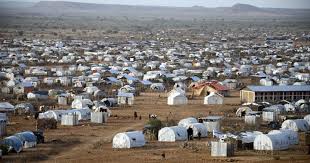Six months after a new peace deal was signed between warring factions of President Salva Kiir and his ex-deputy, Riek Machar, more than 140,000 South Sudan refugees who fled the country at the peak of the civil war have returned home.
According to the nation’s Ministry for Humanitarian Affairs and Disaster Management, the returnees came from the Central African Republic (CAR), Ethiopia, Sudan and Uganda.
The government is working with the United Nations High Commissioner for Refugees (UNHCR) and the International Organisation for Migration (IOM) to rehabilitate, resettle and reintegrate the returnees into their previous communities, Undersecretary at the Ministry, Peter Kulang Gatwech told The EastAfrican.
“We have set up an emergency fund through which we provide foodstuff, medical care and a few other social services to individuals and families of returnees,” Gatwech said, adding that returnees will take six to 12 months under the care of the UN and government but are expected to provide for themselves thereafter.
Verification of ownership of property such as land will be conducted and the government is also organising national dialogue at village level as part of the re-integration.
The devastating effects of the civil war
President Kiir in 2013 sacked Machar as first deputy president, accusing him and 10 others of planning a coup. This plunged the world’s youngest country into a war that saw over two million refugees flee into neighbouring countries. A second breakout of the civil war occurred three years later when a power-sharing deal between Kiir and Machar failed.
In a statement in November 2016, the head of the UN Commission of Human Rights in the country, Yasmin Sooka, at the end of a visit noted that there was a steady process of ethnic cleansing underway in several areas of South Sudan using starvation, gang rape and the burning of villages. Allegations which were dismissed by the government.
About 400,000 people are estimated to have been killed in the war that has lasted nearly six years. Washington Post reported that more than 4 million people have been displaced, with about 1.8 million of those internally displaced, and about 2.5 million having fled to neighbouring countries.
Fighting in the agricultural heart in the south of the country has soared the number of people facing starvation to 6 million with famine breaking out in some areas. The country’s economy has also been devastated. According to the IMF, real income has halved since 2013 and inflation is more than 300 percent per annum.
Ceaseless ceasefire deals
A first ceasefire agreement was reached in January 2014, with negotiations mediated by the Intergovernmental Authority on Development (IGAD), which includes the eight regional nations, as well as the African Union, UN, China, the European Union, the United States of America, the United Kingdom and Norway.
However, fighting continued and several more peace deals followed, all to no avail. Then in August 2018, another power-sharing agreement came into effect. The latest peace deal brokered by the IGAD ensured a ceasefire and return of relative peace in last year. Under terms of the agreement, the government and rebel groups are supposed to form a transitional government by May 12.
Modest progress
Last week, the UN reported “modest progress” made by warring groups in establishing lasting peace in the country. “The ceasefire continued to hold in most of the country and the overall security situation improved,” the UN Secretary-General, Antonio Guterres, said in a report covering the past three months.
However, the situation remains fragile, the UN leader warned, citing intermittent clashes between government forces and rebels, along with increased fighting among tribal groups and alarming levels of sexual violence against women and girls.
Thus, there is widespread doubt among the refugees on whether the peace deal will hold for long. Most do not wish to go back home immediately as they believe the peace deal could come apart forcing those who make an early return into fresh flight. They would rather stay in the camps until the situation stabilizes.More so, some of the refugees are well settled and rebuilding their lives by learning new vocational skills in camps in order to either survive in the short run or approach life after the camp with a new skill set.
Sidebar
Magazine menu

 Teline V
Best News Template For Joomla
Teline V
Best News Template For Joomla
20
Sat, Apr
0
New Articles










